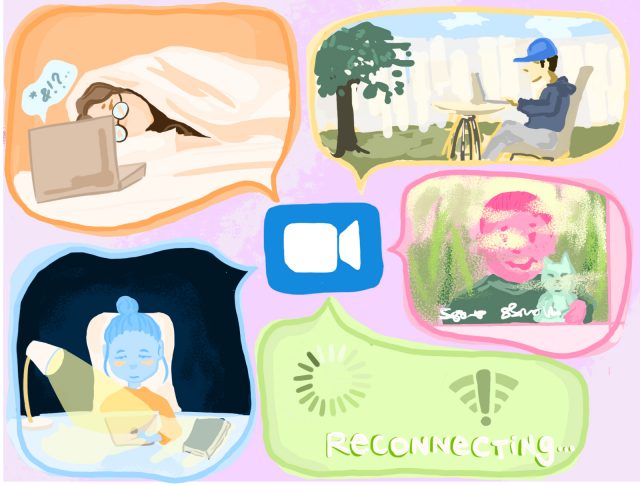This post was updated May 5 at 10:55 a.m.
As a student with six siblings, Katelyn Ngo doesn’t just look after herself anymore.
Ngo, a fourth-year biology student, balances her academic work alongside cleaning, cooking and generally sharing the caretaking role with her parents.
“There are UCLA students that have a much harder living situation, so I don’t want to complain,” Ngo said. “It’s hard for everyone.”
The UCLA student body has been adapting to remote learning since the end of last quarter.
Last month, professors experienced an unfamiliar struggle of learning how to structure their newly assigned online classes. Meanwhile, students have been exploring ways to manage their coursework among technical issues, family distractions and environmental changes.
But with midterms in progress and finals looming overhead, professors and students alike are now truly putting virtual learning to the test. Online instruction has come with its own set of challenges, including time zone differences between students and professors.
Robert Maniquis, an associate professor in the English department teaching a seminar this quarter, is facing this unique challenge in having to teach from Paris.
“My only problem is that in order to teach my courses, I have to teach them from one, two, three in the morning,” Maniquis said. “So I just have to figure out ways to get enough sleep.”
While maintaining a regular schedule during quarantine may help emulate a life similar to one we had on campus, the task is not always an easy job.
First-year neuroscience student Candice Shihady said she struggles with managing her daily habits. Shihady added that creating and sticking to a routine during quarantine has become increasingly tough for her.
The first-year said this struggle has also translated into productivity issues.
“My sleep schedule is also really messed up right now, because it just feels like I’m on break,” Shihady said.
Many students have experienced lifestyle changes because of shelter-in-place orders, and technical difficulties related to remote learning have not made the transition easier.
“I need to leave an hour of homework time dedicated to technical difficulties,” said Danielle Goldwirth, a first-year applied mathematics student.
Goldwirth also said that she spends a lot of time tediously scanning and uploading her homework assignments. For example, the logistical challenges she has faced at home have also found their way into class.
“My math professor has a whiteboard, so a lot of times there is a reflection or the angle is bad and the screen gets blurry,” Goldwirth said. “Sometimes she is writing so fast, and switching from board to board, it’s hard to keep track.”
Second-year computer science student Zachary Finkelstein said that the newfound difficulties of online school are more than technical. He said missed social opportunities with his peers and professors have hindered the learning experience.
“Online school has been very different from in-person classes,” Finkelstein said. “Missing out on the interaction with the professors and other students makes learning harder because we’re not able to ask questions in the same sense or talk to our peers as easily.”
Similarly, graduate students are learning to adjust their coursework because of the unfamiliar remote learning environment.
Shannon Burns, a psychology doctorate student, is due to present her research to a dissertation committee over Zoom. Under normal circumstances, PhD students similar to Burns are expected to present their work to a committee of four to five professors of the field in person.
“They tell you how good you did, and then you get to have champagne,” Burns said. “Now having to change gears on that … ‘You’re going to give this presentation, but it’s just going to be online – you’re just going to be doing it as a Zoom meeting in your apartment.’ And then when it’s done, you just turn the computer off, and you’re alone again.”
Burns is not the only one to express these sentiments – many students have also found themselves exploring ways to adapt to the new virtual environment.
“A consequence of online classes is that you’re at home,” Goldwirth said. “Being at home you might get a little distracted from conversation with parents, the TV being on, being able to do other things while in class.”
Finding much-needed harmony between academics and leisure can be integral to the new, unfamiliar learning process. In an effort to keep up with campus life, Goldwirth has found herself jumping onto Zoom meetings and calls with her friends quite often.
“A lot of these meetings can get in the way of classes, but it’s a good way to keep up the social interactions and activities,” Goldwirth said.
For Finkelstein, just being around his family is an incentive to spend time with them over schoolwork.
“I have a harder time actually sitting to do work, especially when the rest of my family is hanging out. It’s hard to say no,” Finkelstein said.
Goldwirth said that students aren’t forced to sit in chairs and watch the board at home, taking away the accountability of the classroom environment.
“The freedom of being in your room means you’re less focused,” Goldwirth said.
The lack of routine, the difficulty of maintaining a high-pressure academic life at home, and the loss of valued social interaction – it’s a combination that can make productivity a struggle for many students.
But according to Burns, who asked some of her own professors for advice on how to function under quarantine, taking a passive approach to quarantine-related stressors may not be the most effective solution for students.
“(Unlike) when we could passively have good friendships and normal life, you kind of need to think harder now about what (it was) about those friendships that made us feel really great and how can we try to replicate that as much as possible,” Burns said. “It helps make that relationship feel closer and provide more support in a really lonely time.”

